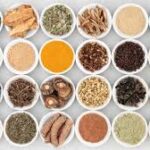The Role of Herbs in Women’s Health and Fertility

Women’s health has always been closely connected to nature, with herbs playing an essential role in supporting hormonal balance, fertility, and overall wellness. Across Africa, Asia, and Europe, traditional healers have used herbal medicine to regulate menstrual cycles, ease childbirth, enhance fertility, and manage menopause.
Today, as more women seek natural alternatives to synthetic drugs, the use of herbs for women’s health is on the rise. Scientific studies are also beginning to validate what ancient traditions have long known: herbs can play a powerful role in improving reproductive and hormonal health.
Key Herbs for Women’s Health and Fertility
1. Fenugreek
Fenugreek seeds are rich in phytoestrogens that help regulate menstrual cycles, improve breast milk production, and boost fertility.
2. Maca Root
Native to the Andes, maca is often called a natural fertility enhancer. It supports hormonal balance, increases libido, and improves energy levels.
3. Red Raspberry Leaf
Known as the “woman’s herb,” raspberry leaf strengthens the uterine wall, supports menstrual health, and eases labor during childbirth.
4. Dong Quai
Used in traditional Chinese medicine, dong quai is called the “female ginseng.” It helps balance estrogen levels, relieve menstrual cramps, and improve fertility.
5. Chasteberry (Vitex)
Vitex is widely used to regulate menstrual cycles, manage PMS symptoms, and increase fertility by balancing progesterone levels.
6. Moringa
Rich in vitamins, iron, and calcium, moringa supports fertility by improving nutrition and blood health. It is also used to enhance lactation.
7. Black Cohosh
Traditionally used in North America, black cohosh helps relieve menopausal symptoms such as hot flashes, mood swings, and sleep disturbances.
8. Ginger
Ginger reduces menstrual pain, improves circulation, and has been linked to improved fertility outcomes in women.
9. Holy Basil (Tulsi)
Holy basil helps reduce stress, which is a key factor in infertility. It also regulates hormones and supports overall reproductive health.
10. Bitter Leaf
Widely used in Africa, bitter leaf is believed to support fertility, improve ovulation, and strengthen the uterus.
How Herbs Support Women’s Reproductive Health
-
Hormonal Balance: Herbs like vitex and dong quai help stabilize estrogen and progesterone levels.
-
Improved Fertility: Maca, bitter leaf, and fenugreek enhance ovulation and reproductive strength.
-
Menstrual Health: Herbs reduce cramps, regulate cycles, and ease heavy bleeding.
-
Pregnancy and Childbirth: Raspberry leaf and moringa support healthy pregnancies and milk production.
-
Menopause Support: Black cohosh and red clover reduce hot flashes, night sweats, and mood swings.
Safety Considerations for Herbal Use
While herbs are powerful, they must be used carefully:
-
Consult Professionals: Always speak with a healthcare provider before starting herbal remedies, especially during pregnancy.
-
Dosage Matters: Taking too much of certain herbs may cause adverse effects.
-
Quality Assurance: Use herbs from trusted sources to avoid contamination or counterfeit products.
-
Avoid Self-Medication: Not all herbs are safe for all women; professional guidance is essential.
Integrating Herbs with Modern Medicine
The future of women’s healthcare may lie in combining herbal wisdom with modern medicine. Increasingly, research institutions are studying the impact of African and Asian herbs on fertility and hormonal health. Hospitals and clinics are also exploring integrative approaches where herbal remedies complement fertility treatments like IVF.
Conclusion
Herbs have long supported women through every stage of life — from adolescence to motherhood and menopause. By improving fertility, balancing hormones, and relieving menstrual and menopausal discomfort, herbal medicine offers natural solutions for women’s health.
With proper research, regulation, and awareness, herbs can become a safe, accessible, and effective part of women’s healthcare, blending ancient wisdom with modern science.
Written by Fawzi Rufai, Medically Reviewed by Sesan Kareem



